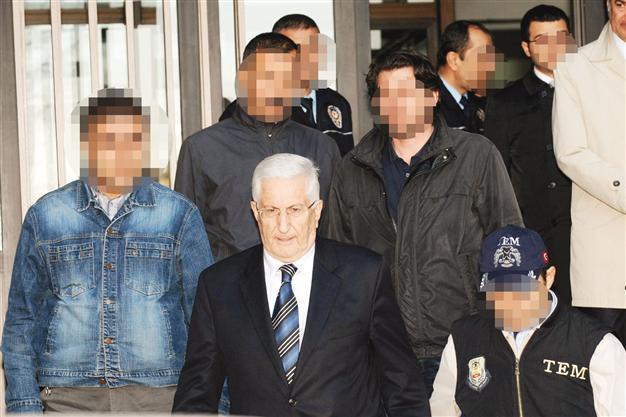Top former general in coup probe arrested
ANKARA

With the arrest of former deputy chief of General Staff Çevik Bir and eight others, the
total number of retired officers arrested in ‘post-modern coup’ case reaches to 18. AA photo
Former deputy army chief Çevik Bir and eight other retired soldiers were arrested pending trial yesterday over the 1997 “post-modern
coup” amid announcements from the military that it was cooperating with the investigation.
Following questioning by prosecutors, the court ordered the arrest of Bir, the leading figure in the campaign that forced late Prime Minister Necmettin Erbakan to resign as part of the “
Feb. 28 process” of 1997, and eight others, bringing to 18 the total number of retired officers arrested since the round-ups began last week. The arrestees include three one-star generals. Eleven people were released after questioning but were banned from leaving
Turkey, while two others who are abroad remain on the police’s wanted list.
The suspects were incarcerated in an F-type high-security prison in Sincan, the Ankara district where the army had sent a convoy of tanks rolling into the streets in 1997 following an Islamic gathering organized by the local municipality. The menacing move set the scene for the momentous meeting of the National Security Council (MGK) on Feb. 28, 1997, at which the military imposed a series of tough decisions on Erbakan, aimed mainly at curbing Islamic education. The prime minister resigned under pressure in June after only about a year in power.
The General Staff said yesterday that prosecutors had requested in February all available documents concerning Bir’s “West Working Group,” the committee that led the campaign against the government. All existing documents were handed over in three installments in March and April, the military added.
The General Staff, however, denied reports that it had also sent the prosecutors a CD containing the names and ranks of officers who were involved in the group. It also denied reports that Bir had asked whether a military official would greet him at the airport in Ankara when he was detained in Istanbul and brought to the capital last week.
President Abdullah Gül, meanwhile, rejected suggestions that he should also testify in the probe as one of the ministers of the ousted government and explain why he signed documents imposed by the military.
As a state minister, Gül said he was not member of the MGK and did not sign any papers, adding that the issue was never discussed by the Cabinet.
“Of course I’m one of the people who went through that period, but I don’t have my signature on the decisions,” he told reporters ahead of his departure for the Netherlands.
Asked whether a similar investigation should be launched into the so-called “e-memorandum” of April 2007, in which the military threatened to step in to defend the secular system after Gül became a candidate for president, he said, “This is an issue for the jurists to take care of.”
